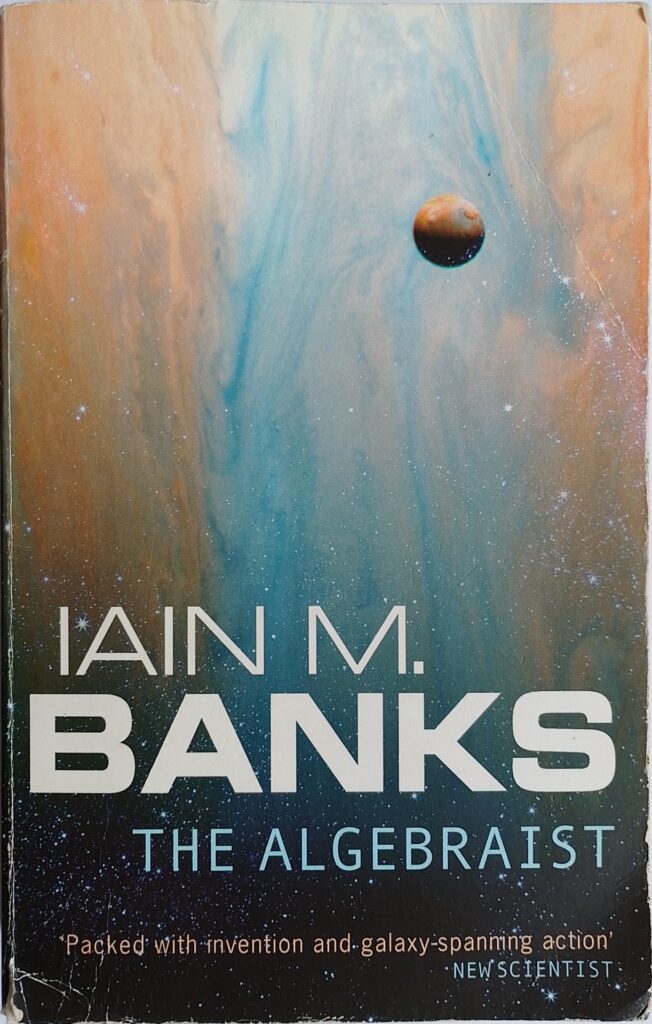First published 2004. Orbit paperback, 2005, pp 534, c. 170,000 words.
Don’t expect anything much about mathematics or even mathematicians, despite the title. There is a formula somewhere in here but it’s a McGuffin – of no interest. What we do have is a comprehensive history of the entire galaxy (and beyond) from the bang to the distant future where humans are but one of many weird and wonderful creatures. Banks’ imagination is at full throttle in this one, inventing almost-plausible intelligent species, each more outlandish than the last. This is not set in the ‘Culture’, the future that features in many of Banks’ SF books, but it is a near cousin.
The main protagonist, Fassin, is a Seer, a human who is part of a group of families, professional rivals, devoted to the study of the Dwellers, a species that inhabits the atmosphere of gas-giant planets. The Dwellers have been around since shortly after the galaxy formed and rumours abound about their technologies. However, they seem lackadaisical and, in human terms, have rather nineteenth century attitudes, enjoying dangerous sports, collecting information just for the fun of it, and remain largely unconcerned with other species who come and go while the Dwellers live on through the ages. A few Dwellers tolerate the visits of the Seers, and occasionally let them see some of the information they have gathered.
On one of Fassin’s expeditions to the Dwellers he accidentally brought back something that contains hints of Dweller secrets, which if uncovered would grant the holder immense power. Forces gather for a violent showdown.
We get back-story of Fassin’s life and short interludes from the point of view of other characters, notably some of Fassin’s youthful friends and ‘The Archimandrite Luseferous’ from who’s name you can tell is very bad. Banks always seems to inject an element of horror into his SF. Personally, I don’t like to read of torture and sadism, but one can’t help admire Banks’ inventiveness even in this sphere. Other ‘bad characters’ are anyone associated with the military, big business, right-of-centre politics, or the powers-that-be and those privileged by inherited wealth. The authoritarian government uses torture to supress dissent and calm disorder, just like many governments do today on our planet; nothing new there.
Banks’ writing style is smooth, without pretention, and therefore easily readable. There are one or two bits of what one might think of as poor editing when words such as ‘basically’ and ‘obviously’ crop up near to each other [p222]. The reader must have a reasonable tolerance for baroque sentences such as ‘Stars swung, as ever, then became just the backdrop to a vast gnarled craft, a giant torus-shaped ship two hundred kilometres in diameter, all black gleaming ribs and fractured facets, glinting in the weak light of a far-distant sun like a great rough crown of wet coal: the Cineropoline Sepulcraft Rovruetz, a vessel of the Ythyn’s vastly dispersed Great Expiratory Fleet, a Death Carrier.’ [p407]
I had been warned off this book by a fellow SF enthusiast who said that all he could recall of it was some chap wandering the galaxy without achieving very much. Even Banks must have had his doubts when he has Fassin think on arrival somewhere ‘Shit, more names to deal with, more places to take in, another damn step along the way.’ [p401]
At the end there are still some unresolved issues and characters who’s fate is undeclared, for example Fassin’s fiancée, Jaal Tonderon. She seems to have been forgotten along the way. Others are rather pointlessly discarded or just sail off into the sunset. Rather unsatisfying to have so many loose ends. Banks apparently said that the book could become the first part of a trilogy but it never did. https://en.wikipedia.org/wiki/The_Algebraist (viewed 21/02/23).
Banks described himself as an SF writer who occasionally wrote contemporary fiction. For this reader, an ardent SF fan, his contemporary output is far more enjoyable. Maybe I’m just not keen on fantasy, and this is rather more that than hard SF. The book was nominated for a Hugo award in 2005, so presumably some rated it highly.
© William John Graham, February 2023

